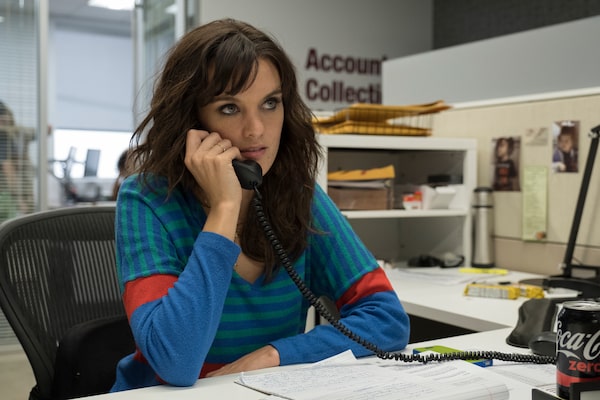Black Monday follows Maurice (Mo) Monroe (played by Don Cheadle, left).Erin Simkin/Showtime
Briefly: There’s a lot to be said for short-form content. A lot.
This column has complained before about the trend of bloated storytelling that Netflix has created: too many series that have too many episodes. Sometimes, at about Episode 7 of a 10-part series, you get the feeling that this part of the narrative exists only because 10 episodes were ordered. Everybody involved, apart from the Netflix executive with a very specific idea of what binge-watching means, could have told the story in six.
The recent flourishing of short-run series with 30-minute episodes is, in part, a reaction to Netflix bloat. It’s not about viewers with short attention spans. Nor is it about diminished budgets or lowered expectations. It’s about getting down to the business of impactful storytelling.
For the viewer – and for the reviewer – there is the added bonus of acknowledging or savouring a series that doesn’t quite work, but is compelling in short bursts. This list of three such shows also illustrates how much provocation and power can be achieved.
That’s certainly the case with Black Monday (Sundays, 10 p.m. on Crave and on-demand). So much is packed into the first episode of roughly 35 minutes that some of it backfires or whizzes by – and yet it is compelling, like a slap in the face. Made for Showtime and intended to offer a fictional background story to the stock-market crash of 1987, it’s all David Mamet-like dialogue and brief scenes of raw, bawdy comedy. Don Cheadle plays Maurice (Mo) Monroe, a trader running his own rogue trading shop.
Loud, rich and flashy, he’s essentially a guy with a gambling addiction. He’ll take extraordinary risks for a big pay-off. The show isn’t really about buying and selling; it’s about attitude and risk. In the early going, Mo toys with recent MBA grad Blair Pfaff (Andrew Rannells), a guy proud of his own work ethic and creation of new trading software. Actually, he’s just a pathetic version of Mo. What transpires is a firestorm of jokes about Nancy Reagan and the Top Gun movie, among other eighties references. And it is bracing in its full-throttle depiction of stupefying male greed.

SMILF is a dark comedy that follows the life of Bridgette Bird (played by Frankie Shaw, seen above), a beleaguered single mom and actress in South Boston.Colleen Hayes/Showtime via The Associated Press
SMILF (Sundays, 10:30 p.m. on Crave and on-demand) has arrived for a second season amid some controversy. A dark comedy in the realistic tradition, it’s created, written and directed by Frankie Shaw, an actor and writer who was little-known before season one had its debut in late 2017. She plays a version of herself as Bridgette Bird, a beleaguered single mom and plugging-away actress in South Boston. She has a young, biracial child named Larry, and the dad stops by for a few minutes when he can. Generally, Bridgette is alone with the kid, lonely and broke. But she has a remarkable fantasy world, one that can be disturbing to watch come to life. One episode this season has a Harvey Weinstein figure and it veers into the distasteful in a way that only a creator as original and confrontational as Shaw could get away with.
But the controversy around SMILF is not about that. Shaw was accused of workplace misconduct, including inappropriate handling of sex scenes between two actors on the show. One, Samara Weaving, asked to be released from her contract and has since left the series. In the current climate, the complaint has to be noted here. SMILF is a very strange beast. In one sense it’s a microcosm drama of what happens to women of a working-class background as they age, try not to become invisible and use their wits to survive mentally. In another sense it is raw, angry and disturbingly at peace with the perversity inside the main character’s head.
HBO's Crashing is back for a third season and does in 30 minutes what a Netflix series would take hours to approach.Craig Blankenhorn/HBO
Crashing (Sundays, Crave/HBO 10 p.m. and on-demand) is also back for a third season, and it’s one of those series that just gets better. It still has Pete Holmes as the central character, a version of himself, a clean-material comedian who tries to stay true to his conservative religious upbringing. But it strays into story lines that are sometimes beautifully, wryly funny and, on occasion, formidably unnerving and blunt.
There’s an upcoming episode in which Holmes does a weekend comedy gig at a club in a mall in New Jersey with two other comics. The headliner is the rude-and-crude masculinity-mascot Jason (Dov Davidoff) and the other is a young and amiable woman, Ali (Jamie Lee). What happens as they perform their routines, interact with each other, and the club’s staff, is a little masterpiece of vivid, perceptive comedy about toxic male masculinity. It does in 30 minutes what a Netflix series would take hours to approach. Often that’s all it takes – 30 minutes or thereabouts.